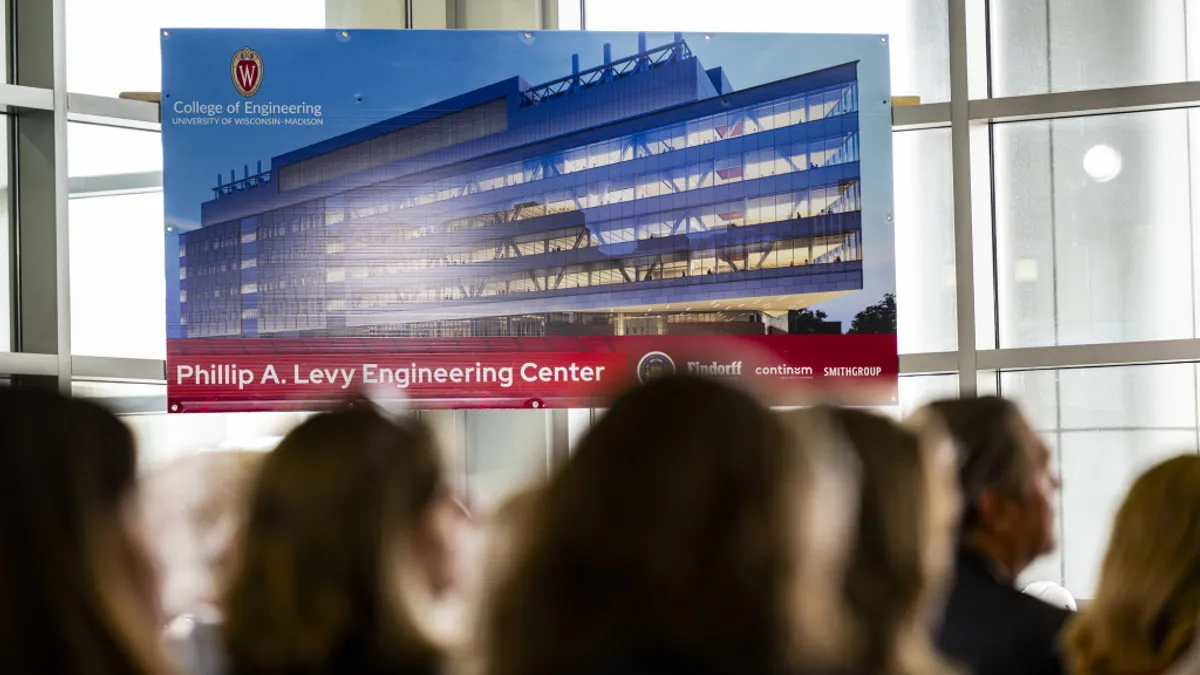See all the women featured in our Women in Construction series here.

Katie Coulson hadn't planned on working in the construction industry. When she went to the University of Wisconsin, her initial career goal centered on finding a path to get a good job that would help her pay for college.
Coulson began on the track to becoming a chemical engineer before shifting to civil engineering because she thought it offered for more opportunities to work with people. She would later work for a semester and summer with the Illinois Department of Transportation where she found her knack for managing people.
"I really liked the problem solving — there’s a new project and new issues all the time," she said.
Coulson would later leave road construction for an opportunity with Skanska USA in Portland, Oregon, where she has moved up the ranks — from field and project controls to vice president and account manager — for the past 18 years.
In her time at Skanska, Coulson has served as chair of the Portland chapter of the Skanska Women’s Network, which helps recruit and retain women at the company, and currently holds the title of national programming chair for the organization.
Empathy's place in construction
Though Coulson's drive and people skills have helped propel her career, being a woman in a male-dominated industry has presented challenges.
"When I first started [with Skanska], I was managing meetings and it was mostly men," she said. "I couldn't just walk in the door and have that instant credibility, but once people knew my capabilities it was a lot easier."
Today, Coulson is highly sought after for her mentorship and advice by both men and women at Skanska and in the industry.
"I think that, as society changes, some challenges that were typically more female-centric issues are becoming male and female issues," she said. "A lot of people ask me how I manage things like having a demanding job and a family because that [issue] is across the board."
And, for Coulson, having empathy for people navigating that balance has helped her be an effective manager.
"At every stage of your life you have issues that you're dealing with. For me, it’s really being flexible with people and understanding where they’re coming from. People feel valued [in that way] for who they are and then they’re a better employee."
Inclusion, too, plays a significant role in both achieving and retaining diverse teams, Coulson said.
"To be productive, people have to feel included,” she said. “We would do different events and have different meetings within our team so that even some people who were pretty introverted could become some of the most vocal people because they feel valued and that what they say matters."
The importance of awareness, mentorship
But awareness of those issues, in the first place, is crucial. Before being on the board of its national committee, Coulson helped start the Portland chapter of Skanska's Women's Network three years ago. Today, the organization serves as a recruiting and retention tool for the company. One way the group helps support its members is through a speed networking event where participants can discuss ways in which they are sometimes excluded.
"In one, we talked about what it's like to be a woman in the trailer out on the jobsite,” she said. “Some people said 'I do that, and I didn't realize how much that affects you.' Sometimes it's just talking about how people think they're doing one thing and realizing how it affects people in another way," she said.
While these events serve as an important forum for many employees, Coulson cites mentorship as a key path to success, particularly for women.
"When you’re trying to figure out what direction to go, it’s good to have other opinions, other thoughts. It’s important for someone to see someone who’s done those things," she said. "For me, as a mentor, I really want people to see that 'here's someone who's like me and they can be successful and I can ask them questions."
Over her career, Coulson actively sought a diverse array of people for advice and guidance — that meant being the first to volunteer for trainings, projects and other work-related functions that meant more face-time with colleagues.
Leading by example
Coulson also emphasizes the importance of seizing opportunities. "Sometimes there’s a list of opportunities — always pick first so you get what you really want, and take the opportunities for things that you’re passionate about because that’s when you can really show leadership."
Still, some of the best guidance Coulson said she has given to colleagues is about learning how to manage time.
"I think it’s really prioritizing what makes you happy. I evaluate almost every single day 'What am I spending my time on?' 'What am I happy about?' and 'Am I doing those things?'" she said. "I was telling an employee that my daughter had 45 basketball games last year and I went to every single one of them because my daughter is my priority. If I can prioritize her, then my work and everything else can all sort of work together."




















